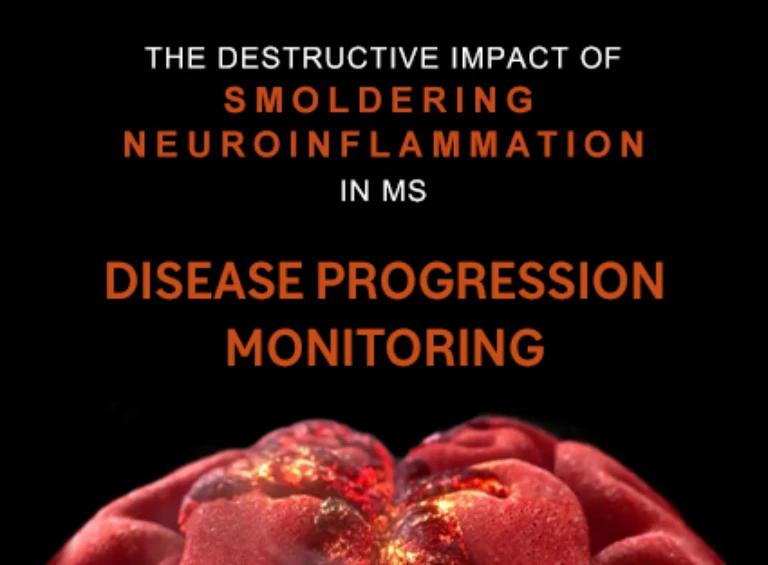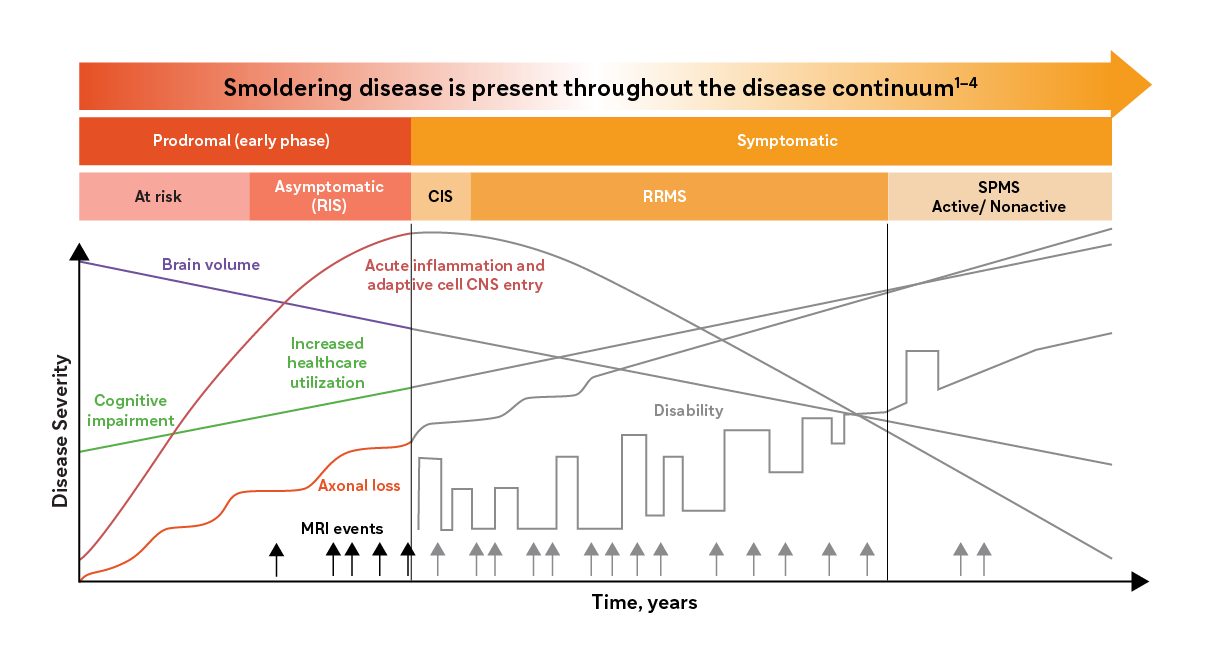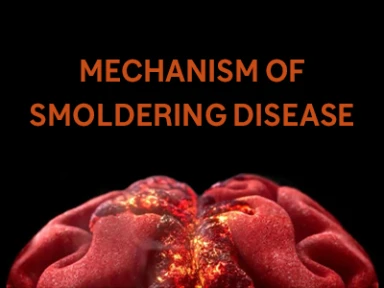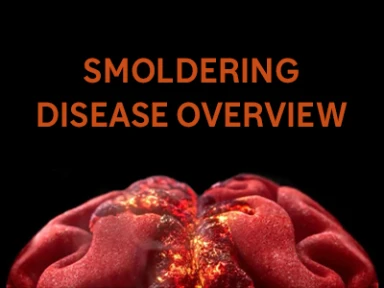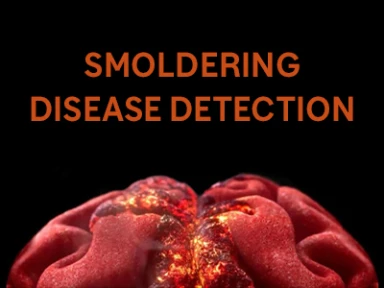Disease Progression Monitoring
Smoldering disease starts early, and persists throughout the disease course1
Proactively monitoring patients for disability accumulation independent of relapses can help identify patients with PIRA and nrSPMS5
Patient reports are an integral part of detecting and acknowledging gradual changes of disability. However, patients may experience difficult6:
- Noticing the gradual onset of symptoms
- Connecting their disability with their MS diagnosis
- Articulating their signs and symptoms clearly
Clinical assessment tools are available to monitor changes in disability progression7,8:
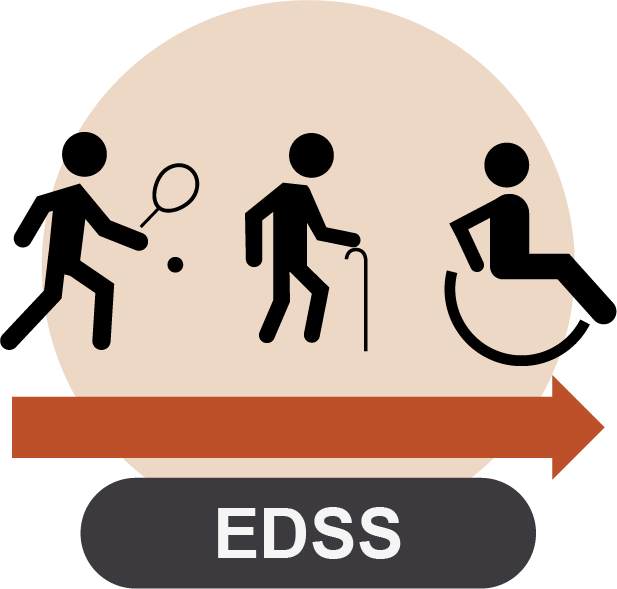
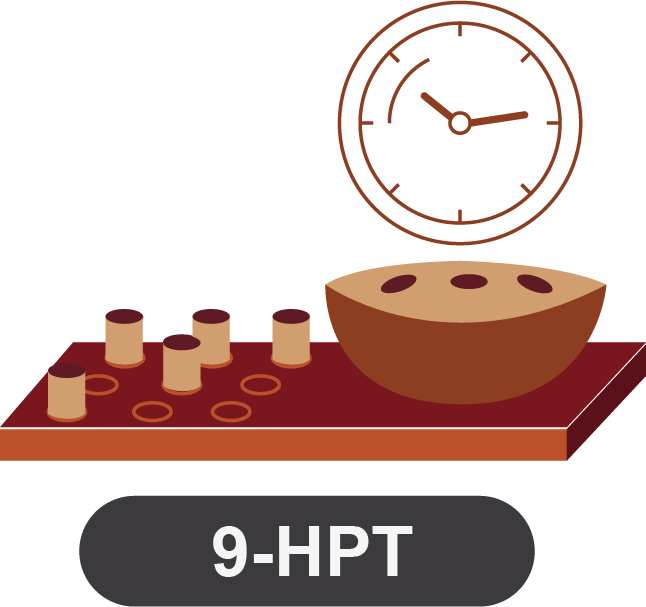
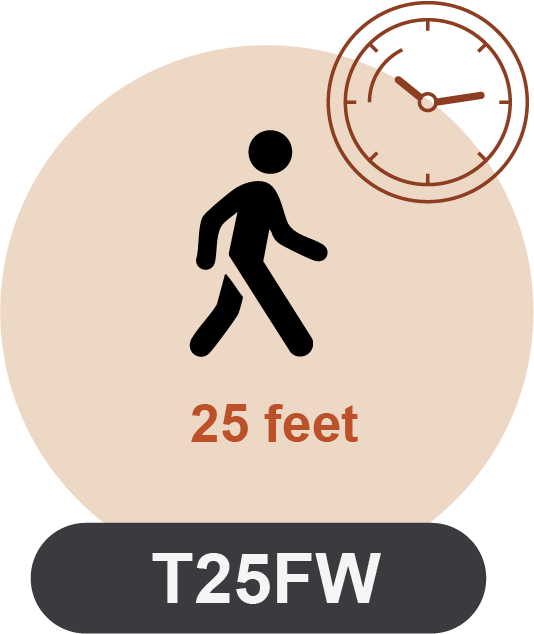
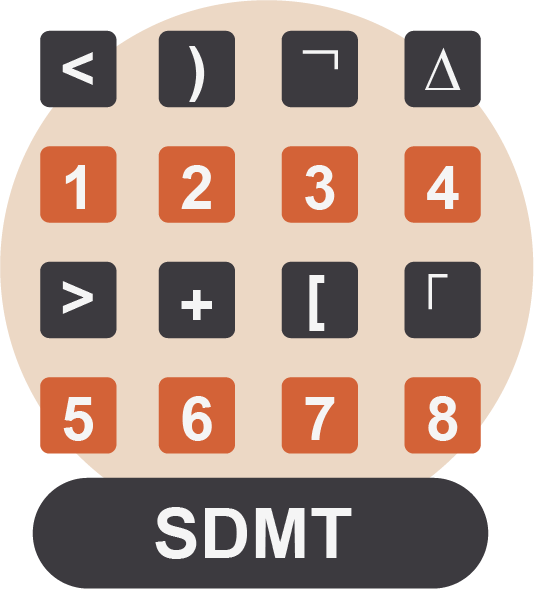
Proactively monitoring patients for disability accumulation independent of relapses can help identify patients with PIRA and nrSPMS1
Smoldering neuroinflammation can drive disease progression across the MS disease spectrum-from RRMS to nrSPMS9,10

The damage from smoldering neuroinflammation can accumulate slowly and manifest as gradual physical and/or cognitive changes over years prior to nrSPMS diagnosis1,11
• Physical decline may present as reduced mobility, fatigue, worsening bladder control, vision, speech, sexual dysfunction, and pain5,12
• Cognitive decline may present as trouble concentrating, difficulty multitasking, being less productive at work, brain fog, and changes in mood/personality5

Patient reports are an integral part of detecting and acknowledging gradual changes of disability. However, patients may have trouble recognizing these changes5

Clinical assessment tools such as EDSS, 9-HPT, T25FW, and SDMT are available to monitor changes in disability progressions7,8

Non-pharmacological interventions may help manage a patient's disability accumulation and may improve quality of life13-15
Non-pharmacological interventions may help manage a patient's disability accumulation and may improve quality of life13-15
Cognitive13,14

- Mindfulness-based approaches
- Cognitive rehabiliton
Physical5,15

- Physiotherapy and physical rehabilitation
- Exercise and weight management
- Dietary modiification
Social13

- Social and group support
For more information about Acute and Smoldering Inflammation, click on this link:
CIS, clinically isolated syndrome; CNS, central nervous system; MRI, magnetic resonance imaging; MS, multiple sclerosis; RIS, radiologically isolated syndrome; RRMS, relapsing remitting MS; SPMS, secondary progressive MS.
- Giovannoni G, Popescu V, Wuerfel J, et al. Smouldering multiple sclerosis: the 'real MS'. Ther Adv Neurol Disord. 2022;15:17562864211066751, doi:10.1177/17562864211066751
- Compston A and Coles AJ. Lancet 2008; 372: 1502–1517.
- Giovannoni G et al. Mult Scler Relat Disord 2016; 9: S5–48.
- Amato MP et al. Arch Neurol 2001; 58: 1602–1606.
- Lakin L, Davis BE, Binns CC, Currie KM, Rensel MR. Comprehensive approach to management of multiple sclerosis: addressing invisible symptoms—a narrative review. Neurol Ther. 2021;10(1):75-98.
- Müller J, Cagol A, Lorscheider J, et al. Harmonizing definitions for, progression independent of relapse activity in multiple sclerosis: a systematic review. JAMA Neurol. 2023;80(11):1232-1245.
- Koch MW, Mostert JP, Wolinsky JS, et al. Comparison of the EDSS, Timed 25-Foot Walk, and the 9-Hole Peg Test as clinical trial outcomes in relapsing remitting multiple sclerosis. Neurology. 2021;97(16):e1560-e1570. doi: 10.1212/WNL0000000000012690
- Brochet B, Deloire MSA, Bonnet M, et al. Should SDMT substitute for PASAT in MSFC? A 5-year longitudinal study. Mult Scler. 2008:14(9):1242-1249.
- Filippi M, Amato MP, Avolio C, et al. Towards a biological view of multiple sclerosis from early subtle to clinical progression: an expert opinion. J Neurol. 2025;272:179. doi: 10.1007/s00415-025-12917-4
- Portaccio E, Bellinvia A, Fonderico M, et al. Progression is independent of relapse activity in early multiple sclerosis: a real-life cohort study. Brain. 2022;145:2796-2805.
- Katz Sand I, Krieger S, Farrell C, Miller AE. Diagnostic uncertainty during the transition to secondary progressive multiple sclerosis. Mult Scler. 2014;20(12):1654-1657.
- Bayas A, Schuh K, Christ M. Self-assessment of people with relapsing-remitting and progressive multiple sclerosis towards burden of disease, progression, and treatment utilization-results of a large-scale cross-sectional online survey (MS Perspectives). Mult Scler Relat Disord. 2022;68:104166. doi: 10.1016/j.msard.2022.104166
- Gil-González I, Martin-Rodríguez A, Conrad R, Pérez-San-Gregoric MÁ. Quality of life in adults with multiple sclerosis: a systematic review. BM.J Open. 2020;10(11):e041249, doi:10.1136/bmjopen-2020-041249
- Feinstein A, Amato MP, Brichetto G, et al. Study protocol: improving cognition in people with progressive multiple sclerosis: a multi-arm, randomized, blinded, sham-controlled trial of cognitive rehabilitation and aerobic exercise (COGEx). BMC Neurol. 2020;20(1):204. doi:10.1186/s12883-020-01772-7
- Kheirouri S, Alizadeh M. Dietary inflammatory potential and the risk of neurodegenerative disease in adults. Epidemiol Rev. 2019:41(1):109-120.

